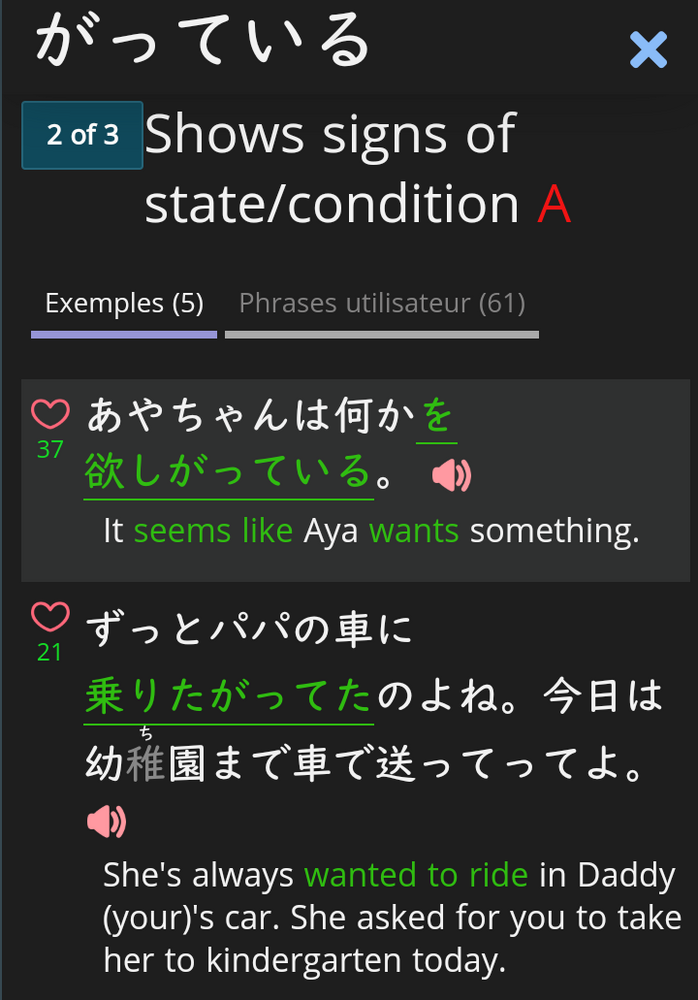
彼は何かを食べたがって居るね。
It seems like he wants to eat something.
34
ずっとパパの車に乗りたがってたのよね。今日は幼稚園迄車で送ってってよ。
She's always wanted to ride in Daddy (your)'s car. She asked for you to take her to kindergarten today.
0
56
田中さんはカラオケを為たがって居るけれど、此の辺にカラオケは有りません。
Tanaka wants to sing karaoke, but there are no karaoke places around here.
0
47
弟は馬に乗りたがって居るので明日一緒に農家に行く積もり。
My younger brother wants to ride a horse, so we are going to go to a farm tomorrow.
0
17
両親が私に会いたがって居る。
My parents want to see me.
0
19
彼はお酒を飲みたがって居る。
He wants to drink alcohol.
0
18
佐藤君は、新しい靴を履きたがった。
Sato wanted to wear new shoes.
0
27
太郎は早く食べ始めたがって居た。
Taro wanted to begin to eat early.
0
3
大人も子供も其の映画を見たがって居る。
Adults and children alike would like to see the movie.
0
11
彼は頻りに結果を知りたがって居る。
He is anxious to know the result.
0
11
彼は其の競技に参加したがって居る。
He wants to participate in the contest.
0
3
彼は有名に成りたがって居る。
He is eager for fame.
0
3
彼女は迚も痩せたがって居る。
She wants to become thin very much.
0
Getting the sentences
Construction
(Elements in parentheses are optional.)
Basic Examples:
言いたがって居る ((someone) wants to say)
Basic Examples:
遊びたがる ((someone) wants to play)
Notes
Only used with third person.
Where this grammar is found
Grammar usage notes
Nothing posted yet!
Questions/Discussion
How does this differ from plain ol’ ~たい?
-たい is used when the speaker wants to do something, when the speaker is talking about someone else wanting to do something, this form is used.
Shows signs of state/condition A
- Wants to A
- Shows signs of state/condition A
- Don't be A (afraid, shy, etc.)
29
あやちゃんは何かを欲しがって居る。
It seems like Aya wants something.
0
19
彼女は怖がって居るよ。
She seems scared.
0
14
皆、何を怖がって居るの?
What is everyone afraid of?
0
18
うちのお父さんは、家に御客が来るのを嫌がって居るの。
My father doesn't like it when guests come to the house.
0
3
私が早く去るので彼らは残念がった。
My leaving early made them feel sorry.
0
9
少年は頻りに自転車を欲しがった。
The boy eagerly wished for a bicycle.
0
3
彼女は人のことを何時も羨ましがって居る。
She is always envious of people.
0
Getting the sentences
Construction
(Elements in parentheses are optional.)
Basic Examples:
欲しがって居る ((so and so) wants)
Basic Examples:
人気がって居る (seems to be popular)
Basic Examples:
楽しがる (seems to be having fun)
Basic Examples:
有名がる (seems famous)
Notes
Only used with third person.
Related Expressions
そう
ようだ
ようだ
Where this grammar is found
Grammar usage notes
Often used with the emotions of others. In the examples below, see ほしがる (seem to want) 乗りたがる (seem to want to ride/board the car). In Japanese, we can never speak definitively about someone else's feelings, so we use things like ~がる or ~そう.
Note that ~がる makes an adjective into a verb.
乗る=verb 乗りたい=adjective 乗りたがる=verb again.
Note that ~がる makes an adjective into a verb.
乗る=verb 乗りたい=adjective 乗りたがる=verb again.
Note on particles:
While ~たい and ~欲しい take the particle が, ~たがっている and ~欲しがっている take the particle を.
While ~たい and ~欲しい take the particle が, ~たがっている and ~欲しがっている take the particle を.
他の人の気持ち
したいことを言う場合「~がる」を使う
したくないことを言う場合「~がらない」を使う
したいことを言う場合「~がる」を使う
したくないことを言う場合「~がらない」を使う
Questions/Discussion
Nothing posted yet!
Don't be A (afraid, shy, etc.)
- Wants to A
- Shows signs of state/condition A
- Don't be A (afraid, shy, etc.)
24
そんなに恥ずかしがらないで堂々とスピーチ為て下さい。
Don't be so shy and please give a great speech.
0
25
怖がらないで、踊ってご覧。
Don't be afraid and try to dance.
0
Getting the sentences
Construction
(Elements in parentheses are optional.)
Basic Examples:
恥ずかしがらないで (don't be shy)
Where this grammar is found
Grammar usage notes
Nothing posted yet!
Questions/Discussion
Nothing posted yet!
